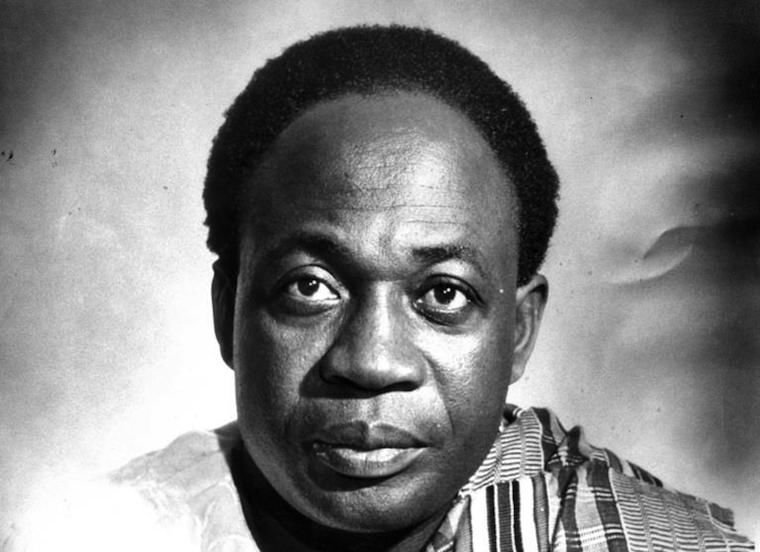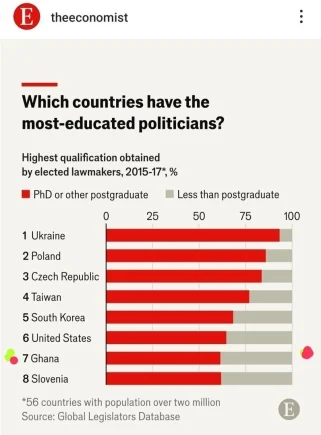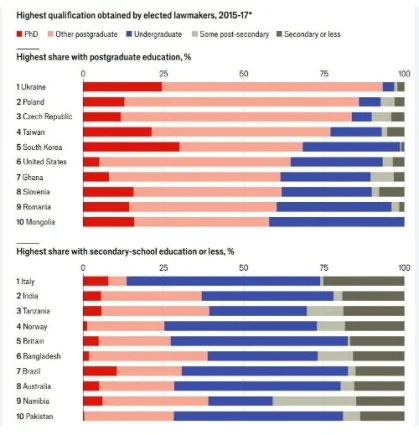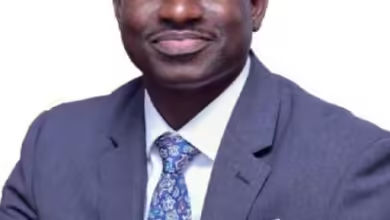
The world’s seventh-most educated politicians are from Ghana.
On a list of nations with the most educated politicians, Ghana comes in at number seven. According to an analysis that examines which nations have the best educated political leaders. Two investigations employing data from 2015, 2017, and 2023 that scholars from international universities carried out served as the basis for this article.
This comes from the Global Legislators Database, which examined 56 nations with populations of two million or more.
In percentage terms, it displays the highest level of education earned by elected lawmakers between 2015 and 2017—from PhDs or other postgraduate degrees to less than postgraduate degrees.
Ukraine is at the top of the list, followed by Poland in second place and the Czech Republic in third.
Fourth place goes to Taiwan, and fifth place goes to South Korea. Following the United States in sixth place are Ghana in seventh place and Slovenia in eighth.
The Economist released the report.
These are the nations with the most highly educated politicians, and is higher education associated with greater performance?

They find it quite straightforward to keep track of the proportion of women (still only 27%) and the average age of elected legislators (now 51 worldwide).
Examining how other traits vary among politicians in different nations has proven more challenging for them.
Nonetheless, this is addressed by two datasets released in October and November.
Scientists can compare elected leaders’ educational backgrounds thanks to these statistics.
Between 2015 and 2017, researchers from six universities collected biographical information on about 20,000 lawmakers from 97 different nations for the first study.
To date, it is the most thorough investigation. The data probably reflects the current situation since, even when governments change, the route to politics doesn’t alter much.
These numbers are far higher than the general population’s global average level of education, which is currently 35% in wealthy nations and 15% in impoverished ones. 56 nations with populations of two million or more are included in the ranking below, which includes data on at least 90% of lawmakers.
With the exception of Volodymyr Zelenskyy, every Ukrainian president since the country’s independence in 1991 has claimed to have a doctorate, demonstrating the long-standing advantages of academic titles in Ukrainian politics.
The proportion of lawmakers with doctorates was comparable even in the 2019 parliament, which was younger and more diverse.
The United States (U.S.), where almost two-thirds of lawmakers have postgraduate degrees, and South Korea, where about a third have doctorates, are two other nations with highly qualified lawmakers.
In contrast, a large percentage of lawmakers in nations like the UK, Norway, and Italy have only completed secondary school.
For instance, without going to college, Sir Lindsay Hoyle was elected Speaker of the UK House of Commons.
Italian anti-establishment politicians Luigi Di Maio and Matteo Salvini also left college early.
The second study
In 2023, researchers in Chile looked at a sample of 6,000 lawmakers from around 30 nations for their second study.
It was discovered that law graduates typically make up the greatest blocs in national legislatures in North and Latin America.
Nordic nations, on the other hand, tend to favour politicians with training in social sciences like economics.
Can citizens expect their leaders to do better than average in nations where politicians have several degrees? This is not well supported by actual data.
Those with college degrees did not serve longer, pass more legislation, or win reelection more frequently than those without degrees, according to a 2015 study that looked at the performance of members of the US Congress over the course of the 20th century.
According to a more recent study conducted in Spain, mayors with degrees did not do any better than other mayors in terms of lowering unemployment, maintaining fiscal balance, or drawing in new citizens.

According to the research, nations that have a large number of attorneys in their parliaments do not always have a much stronger rule of law.
However, it is become more and harder for people without degrees to get their names on the ballot.








